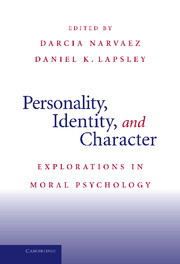Book contents
- Frontmatter
- Contents
- Contributors
- Introduction
- 1 The Moral Personality
- 2 The Moral Functioning of the Person as a Whole: On Moral Psychology and Personality Science
- 3 Moral Science? Still Metaphysical After All These Years
- 4 Cultural Pluralism and Moral Identity
- 5 Neuroscience and Morality: Moral Judgments, Sentiments, and Values
- 6 Triune Ethics Theory and Moral Personality
- 7 Early Foundations: Conscience and the Development of Moral Character
- 8 The Development of the Moral Personality
- 9 Urban Neighborhoods as Contexts for Moral Identity Development
- 10 Moral Personality Exemplified
- 11 Greatest of the Virtues? Gratitude and the Grateful Personality
- 12 The Elusive Altruist: The Psychological Study of the Altruistic Personality
- 13 Growing Toward Care: A Narrative Approach to Prosocial Moral Identity and Generativity of Personality in Emerging Adulthood
- 14 Moral Identity, Integrity, and Personal Responsibility
- 15 The Dynamic Moral Self: A Social Psychological Perspective
- 16 The Double-Edged Sword of a Moral State of Mind
- 17 Moral Identity in Business Situations: A Social-Cognitive Framework for Understanding Moral Functioning
- 18 The Moral Functioning of Mature Adults and the Possibility of Fair Moral Reasoning
- 19 Moral Personality: Themes, Questions, Futures
- Author Index
- Subject Index
16 - The Double-Edged Sword of a Moral State of Mind
Published online by Cambridge University Press: 05 June 2012
- Frontmatter
- Contents
- Contributors
- Introduction
- 1 The Moral Personality
- 2 The Moral Functioning of the Person as a Whole: On Moral Psychology and Personality Science
- 3 Moral Science? Still Metaphysical After All These Years
- 4 Cultural Pluralism and Moral Identity
- 5 Neuroscience and Morality: Moral Judgments, Sentiments, and Values
- 6 Triune Ethics Theory and Moral Personality
- 7 Early Foundations: Conscience and the Development of Moral Character
- 8 The Development of the Moral Personality
- 9 Urban Neighborhoods as Contexts for Moral Identity Development
- 10 Moral Personality Exemplified
- 11 Greatest of the Virtues? Gratitude and the Grateful Personality
- 12 The Elusive Altruist: The Psychological Study of the Altruistic Personality
- 13 Growing Toward Care: A Narrative Approach to Prosocial Moral Identity and Generativity of Personality in Emerging Adulthood
- 14 Moral Identity, Integrity, and Personal Responsibility
- 15 The Dynamic Moral Self: A Social Psychological Perspective
- 16 The Double-Edged Sword of a Moral State of Mind
- 17 Moral Identity in Business Situations: A Social-Cognitive Framework for Understanding Moral Functioning
- 18 The Moral Functioning of Mature Adults and the Possibility of Fair Moral Reasoning
- 19 Moral Personality: Themes, Questions, Futures
- Author Index
- Subject Index
Summary
History is replete with atrocities that were justified by invoking the highest principles and that were perpetrated upon victims who were equally convinced of their own moral principles. In the name of justice, of the common welfare, of universal ethics, and of God, millions of people have been killed and whole cultures destroyed. In recent history, concepts of universal rights, equality, freedom, and social equity have been used to justify every variety of murder including genocide.
(Mischel & Mischel, 1976, p. 107)The word “morality” generally refers to conceptions of right and wrong, good and bad, and the principles that define propriety and vice. Moral behavior is therefore motivated by conceptions of right and wrong, and seems to be tied to promoting one's conception of the good, and preventing or punishing perceived moral transgressions. Nevertheless, behavior and actions that some perceive as the height of moral virtue or sacrifice, others might see as an apex of depravity and evil. For example, most Americans were horrified by the September 11, 2001, terrorist attacks on the World Trade Center and the Pentagon. More than 78% of Americans surveyed shortly after the attacks believed the attackers were “evil to the core” (Skitka, Bauman, & Mullen, 2004). In contrast, a Gallup poll of nine Muslim countries (December 2001–January 2002) found that 67% percent of the respondents felt that the 9/11 attacks were morally justified (George, 2002). In short, morality can sometimes be a double-edged sword: depending on one's point of view, morally motivated behavior can be seen as the epitome of virtue or of evil.
- Type
- Chapter
- Information
- Personality, Identity, and CharacterExplorations in Moral Psychology, pp. 355 - 374Publisher: Cambridge University PressPrint publication year: 2009
- 18
- Cited by



